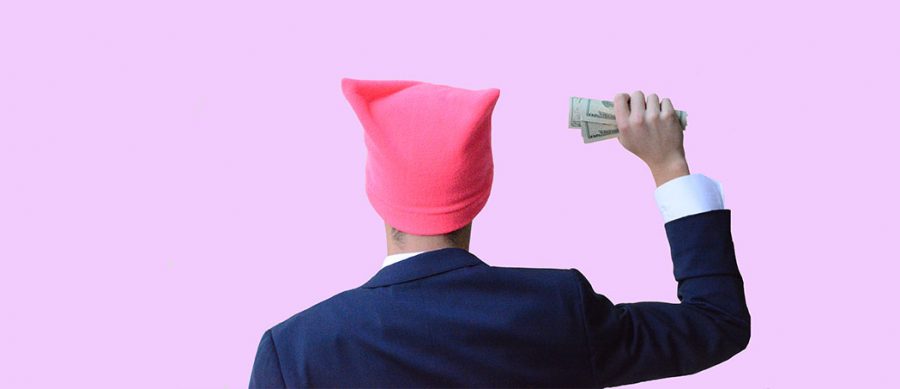As the U.S. midterm elections drew closer, Will Berlin ’19 said he was becoming nervous. Despite a number of new candidates rising to prominence, none of them seemed to have moderate tendencies. For Berlin, who identifies as socially libertarian and fiscally conservative, neither political party seemed to align completely with his views.
Berlin shares some opinions with people who are described as socially liberal and fiscally conservative. However, he chooses to refer to himself as socially libertarian as opposed to socially liberal because he said he stands against government intervention in almost all social issues, favoring marijuana legalization but opposing restrictions on gun ownership.
“Being against government intervention in general leads to a more clear platform,” Berlin said. “That’s why I’m fiscally conservative and socially libertarian. Conservatives believe that the government should stay out of people’s lives as much as possible, whereas liberals see demands on the state as being part of prosperity. That’s why being socially liberal and fiscally conservative makes no sense.”
Emmanuel Zilber ’19, who identifies as a Democrat, said he believes most people who identify as socially liberal and fiscally conservative lack a complete understanding of liberal fiscal policies.
“It’s sort of a default viewpoint,” Zilber said. “If you say you’re socially liberal, it’s usually to [stand behind] disadvantaged communities. A lot of people don’t understand pros and cons for things like universal healthcare or social security reform. There’s a misconception of what it means to be fiscally liberal. It’s not just about wasting money, but it’s spending it in a way that benefits people.”
According to a Chronicle survey of 288 students, 51 percent of respondents said they considered themselves socially liberal and fiscally conservative.
Similarly, a student survey conducted by the history department during the 2016 election cycle found that above 75 percent of students surveyed supported liberal policies including immigration and gun reform policies; however, only 40 percent opposed liberal economic programs that would increase taxes on wealthy Americans.
History teacher Dave Waterhouse said that the school’s unique demographic characteristics contribute to the prevalence of students who say that they identify as socially liberal and fiscally conservative.
“Given the class nature of our population, the upper classes tend to be more economically conservative, but given the fact that they live in very diverse Southern California, which tends to be very liberal socially, they are reflecting both their class and their location,” Waterhouse said.
Beckett* ’19, who is both fiscally and socially conservative, said he believes that lack of discussion of economic issues results in the prevalence of socially liberal and fiscally conservative people.
“One political trend that I do see is a stronger shift toward discussing more conservative viewpoints,” Beckett said. “The conversations that happen at Harvard-Westlake are more about social politics than actual fiscal politics, however. People don’t understand their party’s fiscal views at all. A lot of people just align socially with one platform and then follow along with fiscal policies. A lot of my economics teachers do a really good job of facilitating discussions.”
According to the Tarrance Group, American voters who identify as socially liberal and fiscally conservative often become swing voters. The 2010 study found that socially liberal and fiscally conservative people made up 17 percent of Republicans, 24 percent of Democrats and 41 percent of split-ticket voters in the United States presidential election of 2008.
However, Waterhouse said he did not expect socially liberal and fiscally conservative voters to impact the election due to increased polarization.
“I would think that people like that are going to be a little confused,” Waterhouse said. “If you’re fiscally conservative, you won’t like the Democrats, and if you’re socially liberal, you won’t like the Republicans. In most cases there’s no alternative, so I would guess that many of those people won’t vote.”
During the midterm elections, Democrats regained control of the House of Representatives, and the Republicans maintained control of and had gains in the Senate.
While the failure of moderate Republican candidates like New Jersey 7th District Representative Leonard Lance can be interpreted as a sign of greater political polarization, the success of moderate Democratic candidates like Joe Cunningham in South Carolina’s 1st District suggests the opposite.
Jim Kessler and Lanae Erickson, both vice presidents at Third Way, a center-left think tank, wrote in the New York Times that they believe the majority of Democrats who had success in claiming seats in the House of Representatives were not democratic socialists but rather more moderate Democrats.
In contrast, David McIntosh, the president of Club for Growth, a conservative group that seeks to lower taxes, said during a press conference that “the ‘squishy’ members who lost their races were the ones that didn’t embrace that conservative agenda.”
Regardless of his own political beliefs, Beckett said he strongly encourages people to define their own political orientations.
“I don’t think you should be completely limited to a party’s ideologies,” Beckett said. “I think people who just believe something because it’s what their party believes isn’t a healthy mindset. You need to be able to make your own views about issues, and then align it to parties.”
*Names have been changed.





































